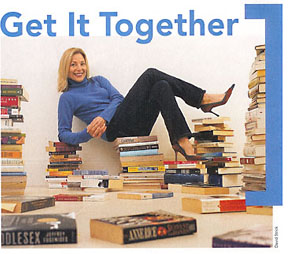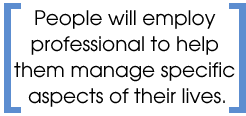To survive and thrive in a complex world, Get It Together
At home, at school and at work, curing the chaos will help make your life more livable
By Linda Rothschild
When I started Cross It Off Your List in 1990, I wanted to provide a service for people too busy to manage all of life’s details, like running errands, waiting for cable installation or  basic bookkeeping. As I found myself orchestrating a move or sorting out closets, it became clear that I was simply organizing. But back then if you told people you were an organizer, they thought you meant union organizer. Not now. Several television shows, from Clean Sweep to The Life Laundry, deal with the topic, and retailers like Hold Everything and The Container Store specialize in products to help consumers bring order out of chaos. It took the National Association of Professional Organizers (NAPO) from 1985 until 2003 to enroll 2, 000 members, but in the past year alone, the group has gained another 800. You might say that disorder has finally come out of the closet. What’s fueling this interest in organization? Let me offer three observations. First, because our culture is busier than ever, it’s difficult to establish and maintain order. When every morning is a struggle to find the car keys or two matching shoes, and every evening you come home exhausted, only to be confronted by piles of clutter, it’s unsettling. People are looking for peace of mind, control and balance, especially at home and in their personal lives. Second, because our lives are ever changing, our circumstances grow more complex. It can be a marriage or divorce, a new baby or elder care, a job promotion or layoff, household upsizing or downsizing. Any of these events can throw someone into absolute chaos or magnify the chaos that already exists. Finally, add to the mix that we’re incredibly acquisitive. People are quick to accumulate new stuff and ignore the old. They simply don’t know how to manage it. As this trend continues, I see a growing need for specialized services and products – in a word, organization. This is good news for my industry. In the future, I believe people will employ professionals to help them manage specific aspects of their lives, the way they hire CPAs, attorneys and personal trainers. The organizer will become as important as the next specialized expert. Within the home, the organizer will join the team that plans a new living space for a client. Already, I’m frequently asked to review blueprints to see how much storage space a new setting allows. Often I see plans for a beautiful, large home with diminished space because the designer failed to consider how clients live and what their needs are. This will change; the organizer will be consulted at the beginning of the project instead of coming in at the end when the client has no place to put everything. Disorganization isn’t just within our homes, however. Organizing professionals already exist withi
basic bookkeeping. As I found myself orchestrating a move or sorting out closets, it became clear that I was simply organizing. But back then if you told people you were an organizer, they thought you meant union organizer. Not now. Several television shows, from Clean Sweep to The Life Laundry, deal with the topic, and retailers like Hold Everything and The Container Store specialize in products to help consumers bring order out of chaos. It took the National Association of Professional Organizers (NAPO) from 1985 until 2003 to enroll 2, 000 members, but in the past year alone, the group has gained another 800. You might say that disorder has finally come out of the closet. What’s fueling this interest in organization? Let me offer three observations. First, because our culture is busier than ever, it’s difficult to establish and maintain order. When every morning is a struggle to find the car keys or two matching shoes, and every evening you come home exhausted, only to be confronted by piles of clutter, it’s unsettling. People are looking for peace of mind, control and balance, especially at home and in their personal lives. Second, because our lives are ever changing, our circumstances grow more complex. It can be a marriage or divorce, a new baby or elder care, a job promotion or layoff, household upsizing or downsizing. Any of these events can throw someone into absolute chaos or magnify the chaos that already exists. Finally, add to the mix that we’re incredibly acquisitive. People are quick to accumulate new stuff and ignore the old. They simply don’t know how to manage it. As this trend continues, I see a growing need for specialized services and products – in a word, organization. This is good news for my industry. In the future, I believe people will employ professionals to help them manage specific aspects of their lives, the way they hire CPAs, attorneys and personal trainers. The organizer will become as important as the next specialized expert. Within the home, the organizer will join the team that plans a new living space for a client. Already, I’m frequently asked to review blueprints to see how much storage space a new setting allows. Often I see plans for a beautiful, large home with diminished space because the designer failed to consider how clients live and what their needs are. This will change; the organizer will be consulted at the beginning of the project instead of coming in at the end when the client has no place to put everything. Disorganization isn’t just within our homes, however. Organizing professionals already exist withi n many corporate cultures, but we just don’t call them that. We all know companies where one methodical person is really running the show. It’s usually the administrative/executive assistant or office manager who maintains the conference room schedule, keeps the petty cash and has senior management’s cell phone numbers. When our super hero is out sick, the office goes haywire. I expect these people will be identified as organizational experts, with certification or advanced degrees. Businesses will hire full-time organization specialists just as they have information technologists, human resource managers and payroll departments. If workers are sitting at desks so crowded with papers they can’t spread out a report and read it, they’re not being productive. This cluttered environment can cloud their thinking and ability to focus; it can heighten stress and reduce productivity. It’s true that companies bring in organizational consultants now, but it’s usually to help high-level executives, not the rank and file. That too will change. I also believe you’ll start to see schools teaching organization skills, so students can better manage their assignments, class materials and time. Kids too often struggle with concepts as simple as which books to take with them every day. Unless organized parents have influenced them, they just don’t get it. If children can learn these skills at a young age, they’ll grow up to be organized adults who can minimize the stress that disorder brings into their lives. This will make organization a priority for everyone.
n many corporate cultures, but we just don’t call them that. We all know companies where one methodical person is really running the show. It’s usually the administrative/executive assistant or office manager who maintains the conference room schedule, keeps the petty cash and has senior management’s cell phone numbers. When our super hero is out sick, the office goes haywire. I expect these people will be identified as organizational experts, with certification or advanced degrees. Businesses will hire full-time organization specialists just as they have information technologists, human resource managers and payroll departments. If workers are sitting at desks so crowded with papers they can’t spread out a report and read it, they’re not being productive. This cluttered environment can cloud their thinking and ability to focus; it can heighten stress and reduce productivity. It’s true that companies bring in organizational consultants now, but it’s usually to help high-level executives, not the rank and file. That too will change. I also believe you’ll start to see schools teaching organization skills, so students can better manage their assignments, class materials and time. Kids too often struggle with concepts as simple as which books to take with them every day. Unless organized parents have influenced them, they just don’t get it. If children can learn these skills at a young age, they’ll grow up to be organized adults who can minimize the stress that disorder brings into their lives. This will make organization a priority for everyone.
